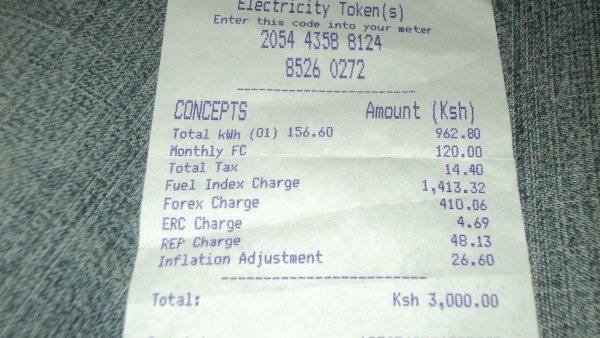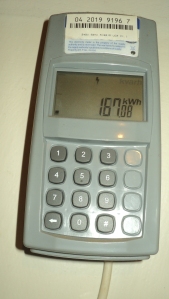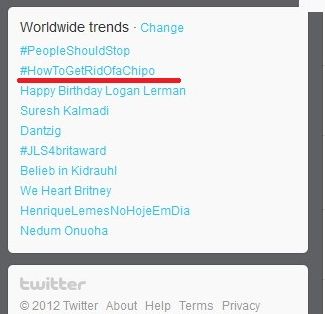Sometime last year, I received a letter from my landlord. It informed me that the whole building would be switching to Prepaid electricity, and that Kenya Power technicians would come and install all the necessary equipment. I didn’t mind the idea because I spent a few years living and working in Dar es Salaam where everyone uses LUKU. LUKU is short for Lipa Umeme Kadri Utumiavyo. What happens is that you buy a set number of units, load your electricity meter, and voila, light! It’s kind of like loading airtime on your cell phone. In fact, it’s better, because once you get a LUKU card, you simply swipe the card on your meter and you’re good to go.

One of the first lessons we learned in Dar was to keep a close eye on the LUKU meter so that we knew when it needed refilling. We learned to calculate how long X number of units would last, so we knew exactly when we needed to reload, and how much. So when my current landlord said we were going prepay, it seemed like a good idea.
The technicians showed up as expected, set everything up, and explained how to use the meter box. I admit I was disappointed since mine looked more like an old calculator, and you had to manually key in the numbers instead of swiping a card, but hey. I asked the guy a lot of questions, like whether I could buy my first batch of ‘electric airtime’ via M-PESA. He advised me against it, saying the M-PESA system hangs a lot, and suggested I buy a Prepaid Token at Uchumi instead. I then asked how much I should buy, and he said they had already loaded 30 Units, so I could relax for a while. Yay!
 The first time I loaded my Prepaid Meter, I spent 1,000/= and got 79 units, which lasted just one and a half weeks. I loaded a second 1,000/= and got 71 Units, which lasted another one and a half weeks. My third 1,000/= only got me 58 Units … WTF? I had read on Twitter that the first load of every month has a levy attached, so you’d get fewer units. I also heard, again on Twitter, that buying Prepaid Tokens by M-PESA means you get 10% fewer units because of some kind of service charge. I ended up spending 3500/= during my first month of Prepaid Power, and I wasn’t amused, because my Postpaid electricity bill generally ranged between 300/= and 2300/=. And no, the meter does not allow backsies, so I can’t switch back to Postpaid.
The first time I loaded my Prepaid Meter, I spent 1,000/= and got 79 units, which lasted just one and a half weeks. I loaded a second 1,000/= and got 71 Units, which lasted another one and a half weeks. My third 1,000/= only got me 58 Units … WTF? I had read on Twitter that the first load of every month has a levy attached, so you’d get fewer units. I also heard, again on Twitter, that buying Prepaid Tokens by M-PESA means you get 10% fewer units because of some kind of service charge. I ended up spending 3500/= during my first month of Prepaid Power, and I wasn’t amused, because my Postpaid electricity bill generally ranged between 300/= and 2300/=. And no, the meter does not allow backsies, so I can’t switch back to Postpaid.
The next time I bought electricity, I went straight to Stima Plaza. This time, my 1000/= got me 69 Units. I asked the cashier what that was about and he explained that the cost of Prepaid Tokens is dependent on the exchange rate. That means depending on the strength of the shilling, 500/= can buy you 30 Units one month, 50 Units the next month, then back down to 45 Units on Month Three. The problem with this is simple. I know I spend roughly 200 Units a month. But those same 200 Units can cost anything between 2000/= and 4000/= depending on the exchange rate, which makes it hard to budget for my electricity bill.
Now, remember the 30 Units that came loaded in the meter? Well, about a week ago, I  received a text. Apparently, Kenya Power wants their units back. I was pretty pissed off because I calculate my usage down to the very last unit, and having 30 Units summarily deducted from my meter is screwing me seven ways south of anywhere! I don’t know why they’d claim the units almost a whole year later. And … thing is … I can’t remember the technician actually saying the units were free. Aw crud!
received a text. Apparently, Kenya Power wants their units back. I was pretty pissed off because I calculate my usage down to the very last unit, and having 30 Units summarily deducted from my meter is screwing me seven ways south of anywhere! I don’t know why they’d claim the units almost a whole year later. And … thing is … I can’t remember the technician actually saying the units were free. Aw crud!
If you look at your Prepaid Token, you’ll notice that roughly 30% of your bill goes to purchase units. The rest of the bill goes to fuel charges, levies, forex, and so on. So I’m not sure sure about the exact monetary value of the 30 Units that Kenya Power intends to deduct. This month, I bought 3000/= worth of electricity, which gave me 203 Units. That means 30 Units should logically cost about 450/= unless they deduct all the forex and levies. If 450/= is deducted from every household with a Prepaid Meter, that adds up to … a lot of money for Kenya Power. Of course they could argue that we owe them the money anyway thanks to the ‘free units’ but they didn’t specify that we had to pay for them later. A lawyer would probably argue that they didn’t specify we didn’t have to pay for them either. Sigh.

Writer @SunnySunWords, suggested a Twitter initiative that we can use to tackle issues like this. #TwitterBigStick. Another tweep, @BenKiilu added his bit with #TwitterThumbsUp. These hasthags can be attached to any general or corporate compliment/complaint on Twitter. Sunny requests that when we use the hashtags, we include details on the matter and photos where possible. He has also requested we don’t misuse the concept. It’s a sound warning, because while Kenyans on Twitter – #KOT are a formidable force, we often use our influence in an rather unhealthy way. We’ve often have international TTs, but a lot of them are negative and/or frivolous.
 Sunny says the concepts of #TwitterThumbsUp and #TwitterBigStick are not his own, and that we should all use them together to effect positive change. His article Little People Using Little Devices To Tame Big People appeared in his Sunday Nation Column and explains his philosophy quite clearly. A large part of the Kenyan population is made up of young people, and in Sunny’s words, these young people have the power to make a change.
Sunny says the concepts of #TwitterThumbsUp and #TwitterBigStick are not his own, and that we should all use them together to effect positive change. His article Little People Using Little Devices To Tame Big People appeared in his Sunday Nation Column and explains his philosophy quite clearly. A large part of the Kenyan population is made up of young people, and in Sunny’s words, these young people have the power to make a change.
For a lot of people, Twitter is just a way to pass time, so everything you post is done in good fun and with a light touch. They see it mainly as a way to hang out and kid around. On Twitter, it’s never that serious. But we now see what a powerful tool it can be, when it’s wielded properly. Social Media has been used to bolster revolutions in Iran, Egypt, and Tunisia. It has also been used to lash out against SOPA, which, ironically, could have killed the online world as we know it. As digital citizens, we’re ideally placed to recognize and take adavantage of all this.
And this is where my key issue arises. Sunny has been with us for a while, and is nowhere near Generation Y. He has embraced this technological tool and suggested a way to channel it for good. A week or so ago, there was an argument on Twitter about how we should use this tool to make a change. The response was for some tweeps to call others hypocritical for talking the talk without walking the walk.
This generation wields a lot of power, and we use it to start TTs like #USIUChicks.  It has taken someone from a much older era to provide a way for us to use this tool for good. Young people keep insisting that we want to run things at work, at home, in the government, in the world. But if we have power and we can’t choose to use it well unless an older hand guides us, then I’m afraid this might mean the leaders of tomorrow and not quite ready for … tomorrow! As for Kenya Power, they decided to go easy on us and deduct the 30 Units bit by bit. Sigh. Why don’t I feel any better?
It has taken someone from a much older era to provide a way for us to use this tool for good. Young people keep insisting that we want to run things at work, at home, in the government, in the world. But if we have power and we can’t choose to use it well unless an older hand guides us, then I’m afraid this might mean the leaders of tomorrow and not quite ready for … tomorrow! As for Kenya Power, they decided to go easy on us and deduct the 30 Units bit by bit. Sigh. Why don’t I feel any better?

